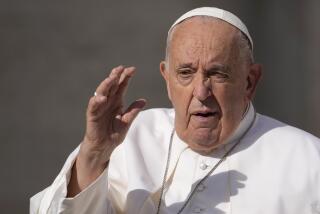Vatican Dictionary Takes Tough Line on Sexuality
- Share via
VATICAN CITY -- The Vatican has issued a dictionary of definitions aimed at clearing up ambiguity about Roman Catholic thought on sexuality and bioethics.
The Vatican Congregation for the Family began quietly distributing its 867-page, Italian-language “Lexicon” to bookshops this week. It did not follow the usual Vatican procedure of calling a news conference to introduce and explain the work.
The book is expected eventually to be translated into English and other languages.
The lexicon takes a tough line on such issues as homosexuality, safe sex, bioethics, reproductive health, cohabitation, the human embryo, gender, maternity, feminism and euthanasia.
In the book’s article on homosexuality and homophobia, for example, Tony Anatrella, a French psychoanalyst, writes that homosexuality “has no rights because it has no social value.”
Homophobia, he says, is “a term created by homosexual associations to stigmatize all those who question and do not accept the banalization and the ‘normalization’ of homosexuality.”
Writing on “safe sex,” Jacques Suaudeau, a French surgeon and student of moral theology, says that “not only is the expression safe sex inexact, but it also feeds a dangerous illusion and opens the way to perverse consequences.”
There is no assurance of safe sex outside a monogamous marriage, he concludes. The article adds that no proof yet exists that condoms can prevent the spread of AIDS.
Alicia Grzeskowiak, a Polish forensic scientist and lawyer, asserts that “no law in the world, no political system can ever make abortion lawful nor the right to abortion, which is in itself unlawful.”
Any state that attacks the right to life from the moment of conception until natural death “is not democratic,” Grzeskowiak writes.
Cardinal Alfonso Lopez Trujillo, prefect of the congregation, said in his introduction that the lexicon is meant to clarify terms for use by parliaments and cultural and international organizations, such as the United Nations, “when they discuss and legislate on themes of the family and life.”
More to Read
Sign up for Essential California
The most important California stories and recommendations in your inbox every morning.
You may occasionally receive promotional content from the Los Angeles Times.













